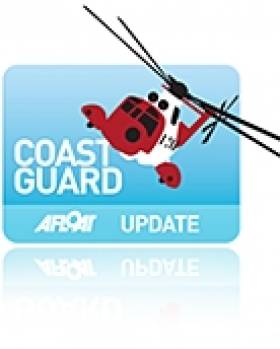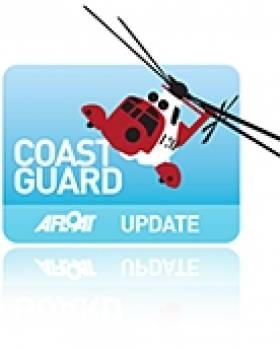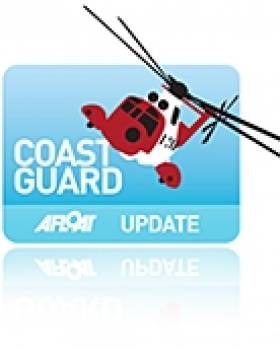Displaying items by tag: Howth Coast Guard
Tourist Rescued From Cold Waters After Attempting to Swim from Howth Head to Ireland’s Eye
A tourist was rescued from the waters off Howth in North Co Dublin at the weekend after attempting to swim from Burrow Beach to Ireland’s Eye.
As RTÉ News reports, the man in his 20s was discovered clinging to a marker buoy around a kilometre from the shore by a passing ferry on Sunday evening (21 April).
The ferry was shortly after met by the Irish Coast Guard’s Howth unit whose volunteers administered care to the casualty, who showed symptoms of severe hypothermia.
The casualty was subsequently transferred by ambulance to Beaumont Hospital.
In a statement on social media, Howth Coast Guard said: “The swimmer, unfamiliar with the area, had become hypothermic and exhausted, clinging to a buoy for safety.
“Thankfully, the last ferry of the day spotted them just in time and brought them ashore.”
A pair of foxes trapped on a sandbank in Baldoyle surprised locals in the north Dublin suburb yesterday morning (Thursday 25 August).
But Howth Coast Guard, who shared a video of the animals on social media, says their predicament serves as a reminder to the public of the dangers of incoming tides.
Luckily in this case the foxes swam back to shore after the morning tide caught them unawares.
? Here’s a very unique video documenting 2 foxes trapped on our local #baldoyle estuary sandbanks, a common incident location.
— Irish Coast Guard - Howth Harbour Station (@HowthCoastGuard) August 25, 2022
?? This video shows how quickly the situation can change and the ground around you disappear until nothing is left. Did they make it back safe?… 1/2 pic.twitter.com/V1IiQCFH7y
The coastguard unit advises the public to always check for their local tide times before walking on the beach — simply by searching for “tide times” or using a site like Tides Near Me.
Howth Coast Guard Trains With Irish Red Cross
#Coastguard - Howth Coast Guard has blogged about its recent medical exercise with the Irish Red Cross.
The multi-casualty medical training exercise involved lowering a number of qualified and trainee emergency medical technicians (EMTs) into Whitewater Brook by the heights rescue team.
These EMTs served as serious trauma victims who were then retrieved through the joint effort of over 40 personnel between the two organisations who worked together to triage, treat and evacuate.
Another recent training exercise, as featured in the video above, involved the safe evacuation of a casualty with a lower limb fracture.
"One of the more common callouts we receive are for people enjoying walking or running in the area who slip and fracture a lower limb or ankle injury," said the North Dublin-based unit of the Irish Coast Guard.
"The team regularly train for this scenario, ensuring all members are able to stabilise, package, and evacuate by stretcher a casualty in this situation."
Howth Coast Guard Reviews A Busy 2012
#Coastguard - Howth Coast Guard responded to 53 calls throughout 2012, with its 25 volunteers clocking up more than 4,000 man hours.
In its review of the year, the north Dublin unit of the Irish Coast Guard noted that while its safety boat Grainne was dispatched to fewer calls on the water, there was an increased number of cliff and beach incidents to attend to, particularly in the Clontarf and Dollymount areas.
Howth also became one of the first search and rescue teams in the State to avail of the Irish Coast Guard's new side scan sonar.
As previously reported on Afloat.ie, the coastguard saved 161 lives throughout a busy 2012 that saw the network respond to almost 2,000 call-outs nationwide.
And 2013 so far has been off to a busy start, marked by a dramatic cliffside rescue in Donegal on New Year's Day.
Howth Coast Guard Rescues Faller from Cliff Path
#RESCUE - The Howth Coast Guard Cliff Rescue team and Irish Coast Guard helicopter Rescue 116 were tasked yesterday evening (26 July) to the cliffs in Howth to assist a woman who fell from the cliff path at Whitewater Brook.
The tourist in her 20s apparently fell some 20 feet from the path while descending to the beach.
Due to the location, members of the public witnessing the incident were unable to get a phone signal and had return to the top of the cliff path to alert the emergency services.
Once tasked the team arrived quickly at the scene, and with the assistance of the helicopter winchman, the woman was treated for spinal injuries as a precaution by coastguard paramedics before being airlifted to Tallaght Hospital.
The teams thanked the quick actions from members of the public which enabled them to respond quickly, and reminded anyone who sees someone who needs help on cliffs, in the water or on the beach to call the emergency number at 999 or 112.































































